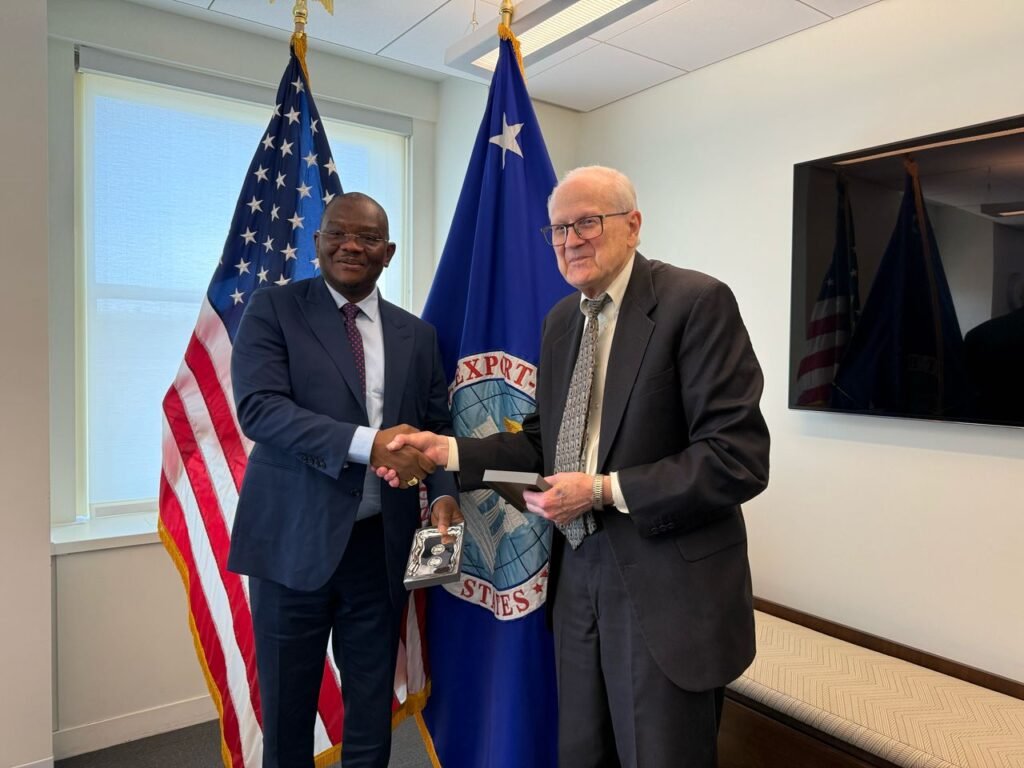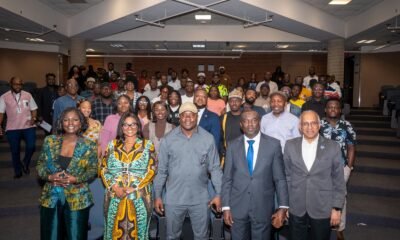Hot!
Awudome Senior High School is 60 years old

The Swahili proverb, “Haijalishi mwendo wako wa polepole ilhali tu usisimame,” meaning, it doesn’t matter how slowly you go as long as you don’t stop, tells a story about Awudome Senior High School at Tsito Awudome, in the Volta Region.
It did not start with a bang, but with the determination of its forbears, the school continue to grow.
On April 22, 2024, the school that started with about 60 students in 1963 as a community day and boarding school, established by the Tsito Native Teacher Association (TNTA) will celebrate its 60th anniversary. The headmaster, teachers, old students and current students, will use the opportunity to pay tribute to those teachers with vision, who gave birth to the school and the American educationist, Mr. William Harper Wheeler, who served as the first headmaster.

Starting as a community school, it has opened up and now has a student population of 2,477. This is made up of 1199 boys, 1,278 girls, with a teaching staff of 143 and 55 non-teaching as at the 2022/2023 academic year.
The school offers six programmes, namely, General Arts, General Science, Home Economics, Visual Arts, Business and Agricultural Science.
It has a modern administration block, four well equipped Information Communication Technology (ICT) laboratories, and spacious arena for co-curricular activities.
The school can also boast of an Audio-Visual Learning Centre and an Electronic Learning Management Support system to enhance teaching and learning. With these innovative interventions put in place, it has yielded positive results with about 90 percent of 2022 WASSCE graduates qualified for further studies.
Like most second cycle schools in the country, the school can pride itself on prominent old students who are contributing their quota to the development of the nation and abroad.

Some prominent old students include Mr. Vuley Senah, General Manager of DDP Outdoor Limited, Mr. Ernest Norgbey, Member of Parliament (MP) Ashaiman, and Prof Leonard Kofitse Amekudzi Provost of the College of Sciences at the Kwame Nkrumah University of Science and Technology (KNUST). It can also boast of very senior officers working with the security services, medical officers, scientists, as well as those who have found their way into the public and civil service, including Dr Evans Dzikum, former chief director of the ministry of defence.
In the media, old students have made their marks, and this include Mr. Kafui Gati, a former senior journalist of the Ghanaian Times, and the late Setorwu Gagakuma, who for a long time was the Ghana Correspondent for many international media organisations.
How it began
The school’s history began when members of the TNTA, an association of teachers based in Tsito, which was formed in the early 20th century, recognised the importance of education to human growth, and the development of society. The group was responsible for the promotion and sustenance of formal education in Tsito-Awudome.
As the name connotes, the association was exclusively made up of sons and daughters of Tsito, but it received solidarity and support from people from other parts of the traditional area, who found good reason to support the TNTA.
Together with community leadership through the Chiefs, the association initiated the idea of a higher institution of learning beyond the senior elementary school level at the time.
As at independence, there were two senior schools, namely Tsito United Middle School and the E.P. Girls Boarding School. With these facilities available, pupils from the surrounding towns and villages of Awudome, Abutia, Sokode, Akrofu, Taviefe and Tongu traditional areas came to Tsito for their basic education.
By the early 1960s, the two schools produced many school leavers, who needed to find avenues within and outside the Volta Region to further their post-elementary education. This presented financial and other social challenges to many families and some graduates of these schools gave up education due to obvious financial predicaments of their families.
It was for this reason that, the TNTA decided to act. In the 1962/63 academic year, they decided to start a Secondary School, which did not only help in providing for the education needs of the youth of Tsito-Awudome, but addressed some of the challenges parents and students suffered.
This novel idea was sold to the Chiefs and people of the community, and it was whole-heartedly accepted. Through communal labour, volunteerism, financial and material donations, the initial structures were put in place towards the commencement of the school in the succeeding academic year.
The preparation, however, was very inadequate given the untold challenges with respect to accommodation, space for permanent structures, finance, and human resources for the start of the school that stared the promoters in the face. Through unity of purpose that bound the local people and the tenacity to persevere, a committee was constituted and tasked with the sole aim of ensuring that the vision was materialised as scheduled.
This committee, with the assistance of other benefactors and the selflessness of the people of Tsito, took on the task and worked around the clock through sacrifice, toil and dedication and gave birth to this priceless heritage in the 1963/64 academic year with 60 students.
It is with hearts of gratitude that the present generation of students, past students and staff, the Chiefs, and people of Tsito-Awudome celebrate TNTA, the members of the various working committees and all other persons and institutions that played numerous roles towards the realisation of this dream.
Achievements
The school has excelled in many fields including the consistent appearance at the National Science and Mathematics Quiz competition (NSMQ), the district champions for 2023 inter- schools’ debate competition and the overall champions for 2023 inter school sports and games competition.
Challenges
In spite of its modest successes, there are a few things that the school needs in order to achieve more. For now, it is in dire need of an assembly hall to accommodate 3,000, which is the number of students that the school envisages to admit.
For the school to be able to function properly, it needs a fully furnished 18-unit classroom block, a six hundred bed capacity dormitory each for boys and girls, a three-storey 12-unit staff flat, 1,200 classroom tables and chairs, 1,000 bunk beds, thirty-five-seater Water Closet facility for boys and girls and the completion of a fence wall project to protect the school from encroachers. The school also needs a 66-seater bus, and a pick-up.
Way Forward
As its motto says, ‘Arise and Shine, ’Awudome Senior High School is ready to rise to the opportunity to shine and thereby create the opportunity for students to develop their skills in cognitive, social, emotional, speech and language, as well as fine motor skill development.
BY JEMIMA ESINAM KUATSINU
Hot!
GEXIM deepens relations with US EXIM Bank

A management team of the Ghana Export – Import Bank (GEXIM) led by the Acting Chief Executive, Sylvester Mensah met with the leadership of the Export–Import Bank of the United States (US EXIM) on Wednesday April 23, 2025 in Washington DC, United States of America.
The Acting President and Chairman of US EXIM, Mr. James C. Cruse and Vice President, International Relations, Ms. Isabel Galdiz received the GEXIM delegation, which included Deputy CEO for Banking, Mr. Moses Klu Mensah and Head of International Cooperation, Mr. Jonathan Christopher Koney at the headquarters of US EXIM.

The meeting offered the GEXIM team the opportunity to share the strategic direction of the Bank in line with the resetting agenda of the President of the Republic, His Excellency John Dramani Mahama for the repositioning of the Ghanaian economy into an export-led one by providing the requisite investment to Ghanaian businesses.
Mr. James C. Cruse expressed US EXIM’s eagerness to deepen its existing relations with GEXIM and proposed the signing of a new Cooperative Framework Agreement following the expiration of a Memorandum of Understanding signed in 2019 to utilize US EXIM’s medium term loan guarantees to procure machinery by GEXIM for qualified Ghanaian Small and Medium-sized Enterprises (SMEs).
Mr.Sylvester Mensah thanked the Acting President and Chairman of US EXIM for hosting the GEXIM delegation and reaffirmed the Ghanaian government’s commitment to strengthening trade and investment between Ghana and its global partners for economic transformation of Ghana with GEXIM playing a pivotal role.
The two teams will be meeting on the sidelines of the 2025 US EXIM Annual Conference on 29th and April 30, 2025 to explore possible areas of collaboration and matching Ghanaian businesses to American companies. The meeting ended with an exchange of gifts.
Hot!
Many SOEs have been used as mere instruments for personal wealth accumulation –Pres.Mahama

President John Dramani Mahama has expressed concern over the misuse of State-Owned Enterprises (SOEs) for personal financial gain by individuals in leadership positions.
Speaking during a meeting with Chief Executives of specified entities under the State Interest and Governance Authority (SIGA) on Thursday, March 13, the President directly attributed the dire state of SOEs to their leadership, accusing chief executives, management teams, and governing boards of prioritising personal enrichment over organisational efficiency.
He pointed to bloated budgets, unjustified allowances, and unnecessary expenditures as factors draining public funds while SOEs continue to rely on government bailouts.
“Many SOEs have been used as mere instruments for personal wealth accumulation by appointees. The chief executives, management, and boards of these enterprises are responsible for this situation. Some SOEs have become perennial loss-makers, draining public funds with bloated budgets, unjustified allowances, and unnecessary expenditures while relying on government bailouts as if entitled to them. Many of these entities are at their lowest point in the entire history of the Fourth Republic,” he said.
President Mahama further noted that many SOEs have been plagued by inefficiencies, corruption, and mismanagement, leading to consistent financial losses. He cited the 2023 State Ownership Report by the State Interests and Governance Authority (SIGA), which highlighted systemic inefficiencies and wasteful expenditures within these entities.
He therefore reaffirmed his commitment to reforming under-performing SOEs and ensuring they serve national interests.
He warned that loss-making SOEs will no longer be tolerated and will either be merged, privatised, or closed.
“I will assess you based on your performance. If you do not align with the pace of the reset agenda, you may be asked to step aside. If that adds to the horror movie, so be it,” he added.
Source: Myjoyonline.com







